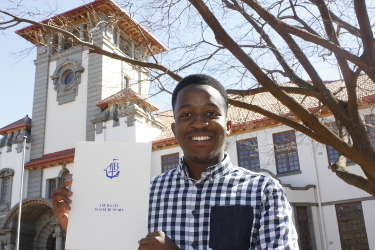Latest News Archive
Please select Category, Year, and then Month to display items
06 April 2018
Photo Rulanzen Martin
 From the left: Dr Thulisile Mphambukeli, leader of the BRICS research team that is exploring the political economy of water and food security, and her research partner, Dr Victor Okorie.
From the left: Dr Thulisile Mphambukeli, leader of the BRICS research team that is exploring the political economy of water and food security, and her research partner, Dr Victor Okorie.
A Brazil, Russia, India, China and South Africa (BRICS) delegation is to hold the 10th Annual BRICS Summit in the last week of May 2018 in Johannesburg. Dr Thulisile Mphambukeli, leader of the University of the Free State (UFS) research team alongside Dr Victor Okorie from the Department of Urban and Regional Planning, in collaboration with Prof Lere Amusan of North-West University, will ensure that water and food security is a prominent feature on the gathering’s agenda.
First, the project titled: “Exploring the political economy of water and food security nexus in BRICS and Africa” will debut at the National Institute for the Humanities and Social Sciences BRICS Think Tank Forum”.
According to Dr Mphambukeli, the key to water security is attitudinal change by means of education and conscientisation. This, she is adamant about, holds the potential to drive behavioural adjustments in the way society interacts with water.
Genetic and social approaches
Dr Okorie asserts that if strides towards reducing the demand for water were to be made, research efforts should be geared towards effecting changes at DNA level. Meaning we need to explore waterwise ways that enable crops and animals to thrive optimally.
The project also looks at social dimensions of water such as flushing a toilet. “Research activities on redesigning toilets, especially the urinal, where more than nine litres of water are used to flush less than one cubic centimetre of urine, are timely in the context of managing water and the food nexus crises,” said Dr Okorie.
Combining the genetic and social approaches would allow us to produce more with a smaller water footprint. This can be made possible by implementing precision agriculture which is about estimating and applying exact quantities of water and nutrients needed for the production of crops or the raising of livestock.
Paradigm shifting policies
Prof Amusan said the team intended to propose functional solutions that take the quality of water into consideration. Equitable production and distribution of water depends on endorsing policies of co-production between citizens, governments and the public sector. BRICS member states mutually consider water and food security as an issue of paramount significance, hence its feature on this prestigious summit’s agenda.
Perseverance is key for 2017 Abe Bailey recipient
2017-08-23

Gosego Moroka, recipient of the 2017 Abe Bailey Travel Bursary,
says his never-say-die attitude is what helped him win the bursary
the second time round.
Photo: Rulanzen Martin
A valuable life lesson can be learned from Gosego Moroka. The fourth-year LLB student was in the top three for the 2016 Abe Bailey Travel Bursary which was awarded to Candice Thickeson. And now in 2017 Moroka is the recipient.
“It means the world to me as it shows that perseverance is the key. I took last year’s loss as a lesson which I would use to improve as a candidate this year and I’m ecstatic that it came full circle.”
Bursary aims to broaden views
The educational tour will start on 21 November 2017. “We will be travelling to the African Union in Addis Ababa, Ethiopia, and then to London, Oxford and Cambridge universities in England, as well as Edinburgh University in Scotland,” Moroka says. The tour group will be hosted by Goodenough College in England. The bursary aims to broaden the views of young South Africans by providing outstanding students the opportunity to engage with students from other universities.
Comprehensive application process
The application process starts with a motivation letter by the applicants stating the reason for applying. They must then submit letters detailing their leadership roles in the community, school, and at university. This is followed by an interview process. “The university will recommend three persons as possible bursars,” Moroka says. The Abe Bailey Trust will then, with the recommendation of the university, make its own decision in selecting the successful candidate.
Great achievement adds to repertoire
“This achievement was extremely important to me as it is testament that greatness is something one works towards.” Moroka is a former 100m South African champion and is part of the Golden Key International Honour Society. And now he is an Abe Bailey Bursar.